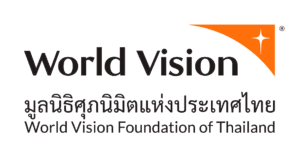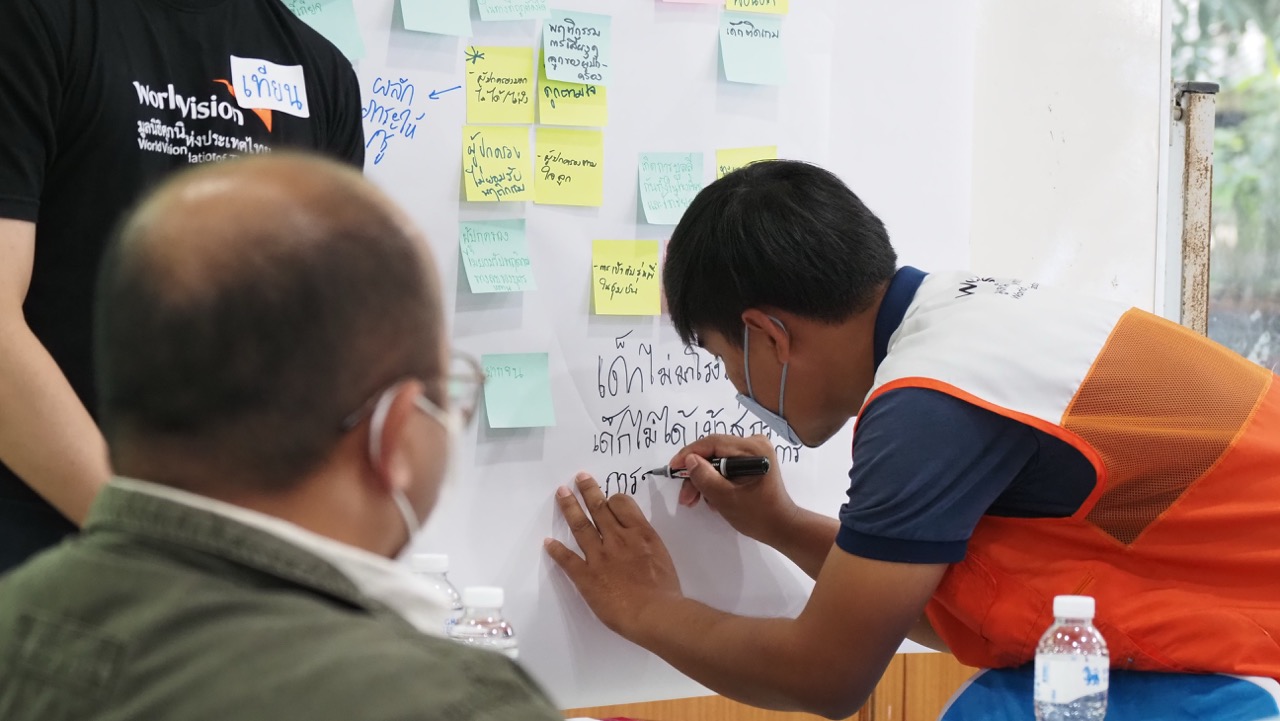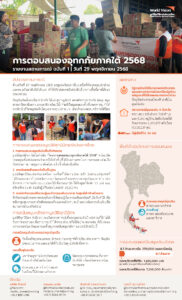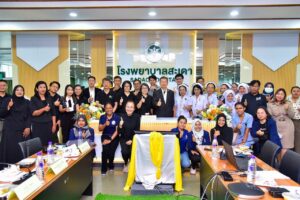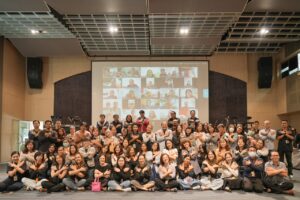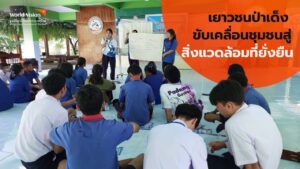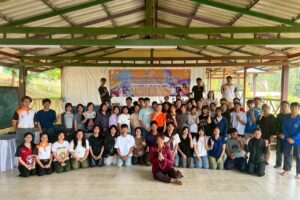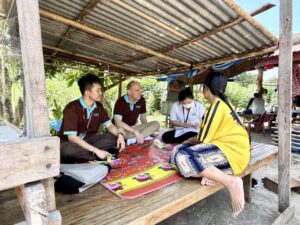“Most children have to stop studying due to their family’s poverty and go out to find work. They start to see the importance of education again after working for a while, when they have the opportunity to be promoted but cannot because their educational qualifications are insufficient,” said the Deputy Director of the Sangkha District Learning Promotion Centre in Surin Province, highlighting the relationship between education and social mobility, especially among the grassroots population or those in poverty.
Joining forces to develop and advocate for policies to enhance educational opportunities and social mobility for grassroots groups.
Under the Memorandum of Understanding for the development of guidelines to promote the social mobility of grassroots populations between the Office of National Higher Education Science Research and Innovation Policy Council (NXPO) and World Vision Thailand, which has been implemented since 2022 and expanded in 2023 through research on the mechanisms of social mobility for grassroots populations: the role of non-profit organisations and the pilot policy-driving project to promote the social mobility of grassroots populations: children and youth groups, implementing in 2023-2024 and continuing until 2025. This will include the implementation of Mechanism for Building Local Network Collaboration to Increase Educational Opportunities for Vulnerable Groups Project in vulnerable areas, namely Sangkha District, Surin Province (rural areas, communities lacking resources and skill development opportunities) and Umphang District, Tak Province (remote highland areas, ethnic communities with infrastructure and educational limitations).
“From continuous research since 2022, it has been found that creating local cooperation networks is a key approach to increasing educational opportunities, reducing inequality, and promoting sustainable development for children and youth. In 2025, we will build on the policy models from the 2023-2024 study results to integrate cooperation among the public sector, private sector, civil society, educational institutes, and communities. Together, we will design mechanisms to support vulnerable youth in accessing education and social mobility effectively. The main challenge, which is currently a national crisis, is children dropping out of school to work,” Amonpajee Auppamai, Child Protection & Advocacy Advisor, World Vision Thailand, shared the background of the implementation.
From policy models to the development of mechanisms and networks in Sangkha District, Surin Province
Data from Equitable Education Fund (EEF) indicates that in 2024, Thailand had 980,000 children and youth not registered in formal education. Among these, 391,747 were newly reported cases. In Surin Province, there are over 12,000 children not registered in formal education, most of whom are aged 15-18.
This is a set of data on the situation of children and youth who have dropped out of school, presented by Thianchai Phattharachanon, Technical Advisor – Education, World Vision Thailand, to the network of 20 organisations in Sangkha District, Surin Province. These agencies include local administrative organisations, universities, schools, sub-district health-promoting hospitals, community leaders, civil society, and youth leaders. This was presented at the launch and discussion meeting of Mechanism for Building Local Network Collaboration to Increase Educational Opportunities for Vulnerable Groups Project at the White Lotus Meeting Room, Khanardmon Pittayakom School, Surin Province. The meeting then proceeded to brainstorming for opinions and suggestions on the policy models, addressing concerns/challenges and implementation approaches/methods, identifying relevant stakeholders, and defining the roles of each agency in driving the policy models into practical implementation.
“In Sangkha District, Surin Province, we have two policy models from research results that will lead to the integration of local cooperation networks as a key approach to increasing educational opportunities, reducing inequality, and promoting sustainable development for children and youth. These are the Positive Discipline Project, aimed at creating an ecosystem conducive to learning and growth for children and youth in families, schools, and communities, and the Utilizing Local Data and Mechanisms to support the School Dropout Project, aimed at reaching at-risk and out-of-school children with mechanisms to help them return to education,” Pluempeeti Laungsuvimol, Policy Model Project Coordinator, World Vision Thailand, talked about the policy models.
Voices from the local network in Sangkha District, Surin Province and recommendations for developing policy models
Boonsuay Laklaem, the head of Tatum Sub-district, Sangkha District, Surin Province, provided input on approaches to prevent children from dropping out of school: “Overall, in Surin Province, the problem of school dropouts stems from family problems. Parents go to work in the city, leaving the responsibility of raising children to grandparents, who tend to spoil their grandchildren. They do not pay much attention to whether the grandchildren go to school or not. Meanwhile, the parents working in the city only focus on sending money back home, which the children spend on unnecessary things like mobile phones and hanging out with friends. Combined with various media that entice children, these leads to a gradual increase in school dropouts.”
Consistent with what Satsawat, 17, the student president of Krathiamwittaya School and a former sponsored child of World Vision Thailand, shared about what he has seen in school that leads to his peers dropping out of formal education.
“There are patterns that help us identify which children are at risk of dropping out of school, for example, children addicted to games, hanging out with friends, not paying attention in class, skipping school, and having academic problems. Some turn to drugs, while others believe what they see on social media, which suggests that finishing only Grade 9 or Grade 12 can still lead to good jobs, steady income, and a luxurious life, without considering whether they can work as hard as those they see. Another accelerating factor is parents who just listen to their children and ignore teachers’ warnings about their children’s absences. I am interested in the policy model project that uses local data and mechanisms to help school dropouts. I would like to have a system that includes tracking, recording progress, and evaluating results, with accurate data to be able to promptly help children who face problems.”
Meena Duangrasee, the manager of Health for the Community Foundation, part of the civil society network, reflected her opinions and suggestions on the risks of children dropping out of formal education, as well as the policy models and the project to create local cooperation networks to increase educational opportunities for vulnerable groups.
“There are many factors that pull children away from school. One significant factor is the learning environment in schools that makes children unhappy. This includes competition, rules, punishment, and bullying among children. These lead to a lack of motivation to study and a lack of life goals. Teachers and parents are also part of these factors. For the Positive Discipline Project policy model to be effective, it must drive changes in the mindset of children, teachers, and parents. Additionally, there are emerging challenges, such as stress, mental health, and substance abuse issues. In practice, collaboration with sub-district health-promoting hospitals and public health offices is necessary. All parties must work together towards the goal of child development.”
The first step in developing mechanisms to create local cooperation networks to increase educational opportunities for vulnerable groups in Sangkha District, Surin Province, has begun. The voices and suggestions from the networks participating in this meeting will be incorporated to improve the policy models to address local issues and capacities. This aims to explore possibilities and develop implementation approaches in collaboration with local stakeholders. All of this will be further developed into mechanisms to support vulnerable youth in accessing education and effectively improving their social mobility in other areas in the future.
